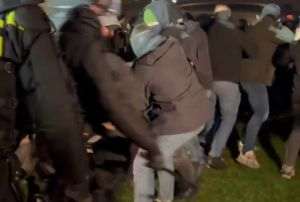Slumping under the mink fur and the leopard bonnet, one bandy old lady, in good clothes, was moving heavily, in a cane, below the columns of the Palace Room, through the 38 degrees of the afternoon, on the Sunday of the referendum.
The square was empty, the asphalt was steaming.
Out of a 24/7 shop, the salesgirl came out and stared.
- This ol' lady is cold, I said.
- That's what I was thinking, the woman said, with her hand to her mouth.
- She's all wrapped up, she must think it's winter and she's happy that she's warm and cozy...
- maybe she's gone out to go the referendum, she said.
A little light came up in my head.
She was right.
Most likely the old woman never went anywhere.
She must have come out for the referendum and she didn't notice the heat.
She must have been living by herself.
I went into my house.
On TV, they estimated that 11% of those who went to the Referendum voted for Băsescu.
I was dumbstruck - man!, how crazy do you have to be to go to the Referendum to vote, if you support Băsescu?!
Then I remembered the old lady and I felt sad.
Poor old lady!
She must have voted for Băsescu.
Her, who never goes out anywhere, she must have thought he needed her help.
Good god!, such dedication!
The line of Băsescu kept going around in my head, "winter is different from summer..."
Those people who didn't understand that they are actually helping bring down Băsescu by bringing him down?!
First of all, they never heard him on the TV, when he asked them to boycott the Referendum.
So, they don't watch TV either.
But they don't read the media, not do they listen to the radio.
They probably don't have any friends to enlighten them, or their friends are just like them.
Normally, they support the head of the state.
For them, any usurpation must be synonymous to disorder and instability.
They think that the rules protect and they therefore support them.
If they have a TV, they were probably stuck on the first urge of Băsescu - "Come to the referendum!" - and missed the second one - "Boycott the referendum!"
Last of all, if they did see the second appeal of the president, then they don't know what "boycott" means, they must have thought it means precisely the opposite: to come and vote en masse, because the president is desperate.
I minded my own business - the topic had impressed me and I thought I had clarified the situation, without realizing that 11% represents almost one million people, and that the explanations I have provided couldn't cover such a big number of people.
In the evening, I heard that a friend of my daughter, who had come to Romania for a few days, voted "NO" in the Referendum.
She's a very clever, very qualified, who works as an expert abroad, for a multinational, commuting between two countries of the European Union.
She intrigued me.
Eventually, after subsequent clarifications, I realized that she probably voted out of an impulse that made her feel she was Romanian.
Interesting.
In the end, her motivation resembles that of the others - abiding by the rules makes us feel that we belong to this country.
The next day, in the office, I heard that one of our colleagues also voted "NO", in the Referendum.
She is exactly the kind of person whom you wouldn't expect that from - young graduate, intelligent and very energetic.
I asked her to explain.
She said that, during the weekend, she went to the seaside with some of her girlfriends, and that they absolutely wanted to go and vote against Băsescu and that, once she found herself in the voting booth, she voted like her conscience told her.
Nice! - craftiness and personality!
Discussing the topic in the editorial office, a journalist warned me that voting no in the referendum "NU", lucidly, does not necessarily, can also mean that in fact, you don't want the USL, but you don't like Băsescu either.
I fell on my ass, when I found that one of our editors, who is a graduate of Political Sciences at the University of Bucharest, who has a scholarship in Brussels, also voted with "NU".
I asked him to explain his option in writing.
I hereby reproduce it:
"I went to vote and voted < NO > as I am not interested or motivated in the dogmatic or pragmatic rhetoric of the referendum. The theory that the vote was a tool, which was speculated by both parties, did not convince me theoretically, nor practically, because an instrumental vote leads to an instrumentalist state of things.
I voted < NO > because, even though Băsescu had a lot of moments where he tried to turn the country into a presidential republic, which it is not, his dismissal would not have corrected this anomaly, thus I was convinced that only keeping him in Cotroceni, together with a government of an opposing doctrine, can achieve, in the long term, a weak semi-presidential practice, which is the characteristic of our republic. Since the referendum encouraged this position, I wanted to express my opinion by going in to vote. It is my vote and my interest and I stand by it, because I am considering what things will look like after the referendum."
Perhaps I should make a long list with what this "NO" meant.
Truth is essential.
Ponta said that Băsescu no longer has any legitimacy, because the suspended president "no longer has any supporters", thus disregarding one million people who actually helped him.
And I don't think that Băsescu values the 11% who didn't listen to him, did not boycott the referendum and endangered him.
The truth is an important thing, which they ignore.




























































